The diagram shown four capacitors with capacitances and break down voltages as mentioned. What should be the maximum value of the external emf source such that no capacitor breaks down? [Hint: First of all find out the break down voltages of each branch. After that compare tham.]
![The diagram shown four capacitors with capacitances and break down voltages as mentioned. What should be the maximum value of the external emf source such that no capacitor breaks down? [Hint: First of all find out the break down voltages of each branch. After that compare tham.]](https://d10lpgp6xz60nq.cloudfront.net/physics_images/NG_PHY_C02_E01_017_Q01.png)
2.5kV
10/3kV
3kV
1kV
The correct Answer is:A
Charge can not exceed 3KCV on upper branch while on lower branch it can not exceed 6KCV.
V1+V2=33+32=2.5KV
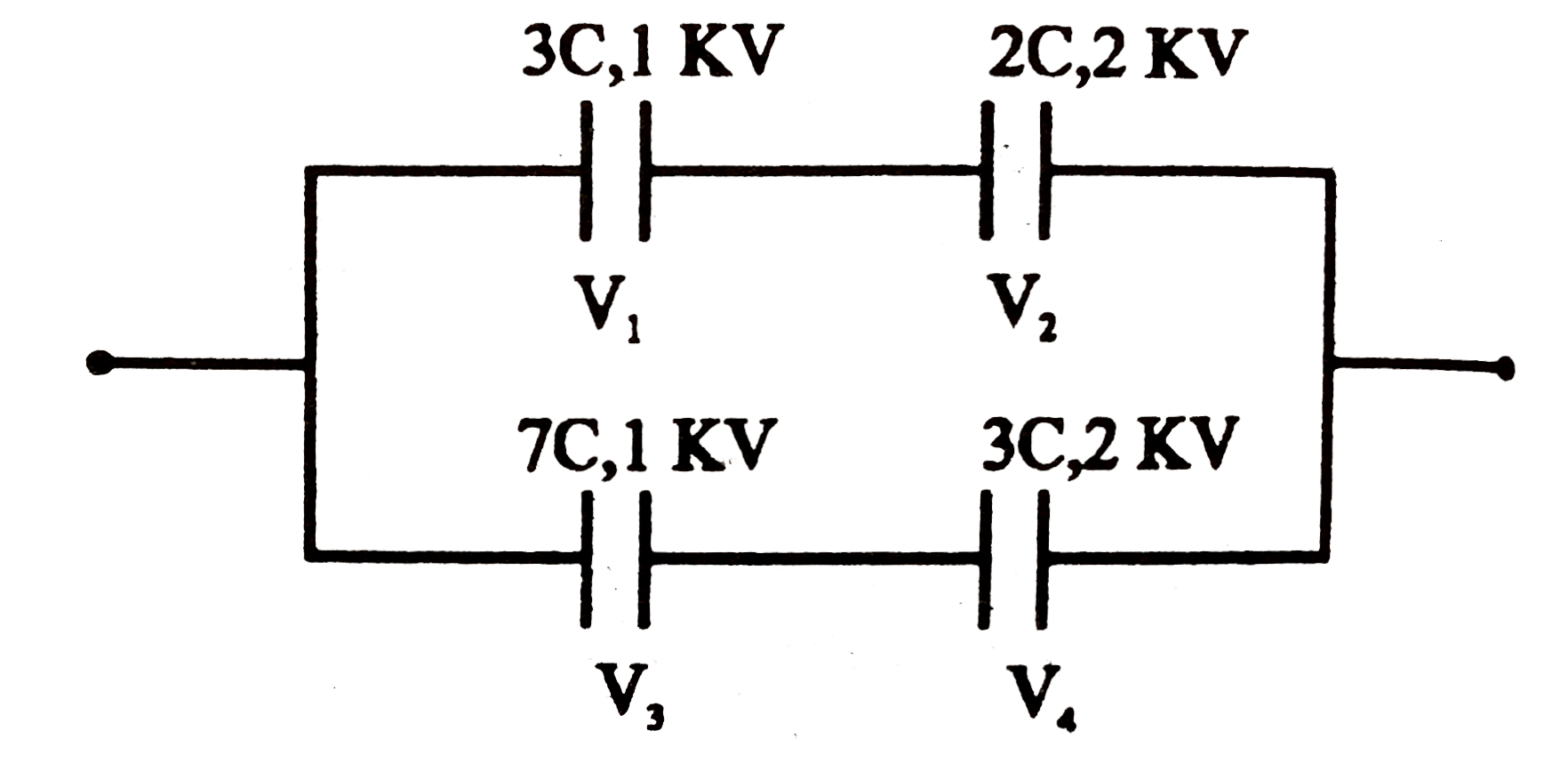
V3+V4=67+63=207KV⇒E=2.5KV
Similar Questions
Find the break down voltage for the capacitors if they are connected in series
 View Solution
View Solution(a) Find the potential difference between the plates of a parallel plate capacitor of capacitance 5μF if a charge +800μC is placed on one plate and-200μC on another plate.
(b) The charege given to plate are as shown. The capacitance between the adjacent plates is C. find the charge on outer surface of plate 3, and potential difference between plate 1 and 2.
(c) If A is area of each plate and d is separation between adjacent plates, find the charge supplied by battery.
(d) Five idential capacitor plates each of area A are arranged such that adjacent plates are at a distance d apart. the plates are connected to a source of emf V as shown. what is the magnitude and nature of charge on plates 1 and 3 respectively?
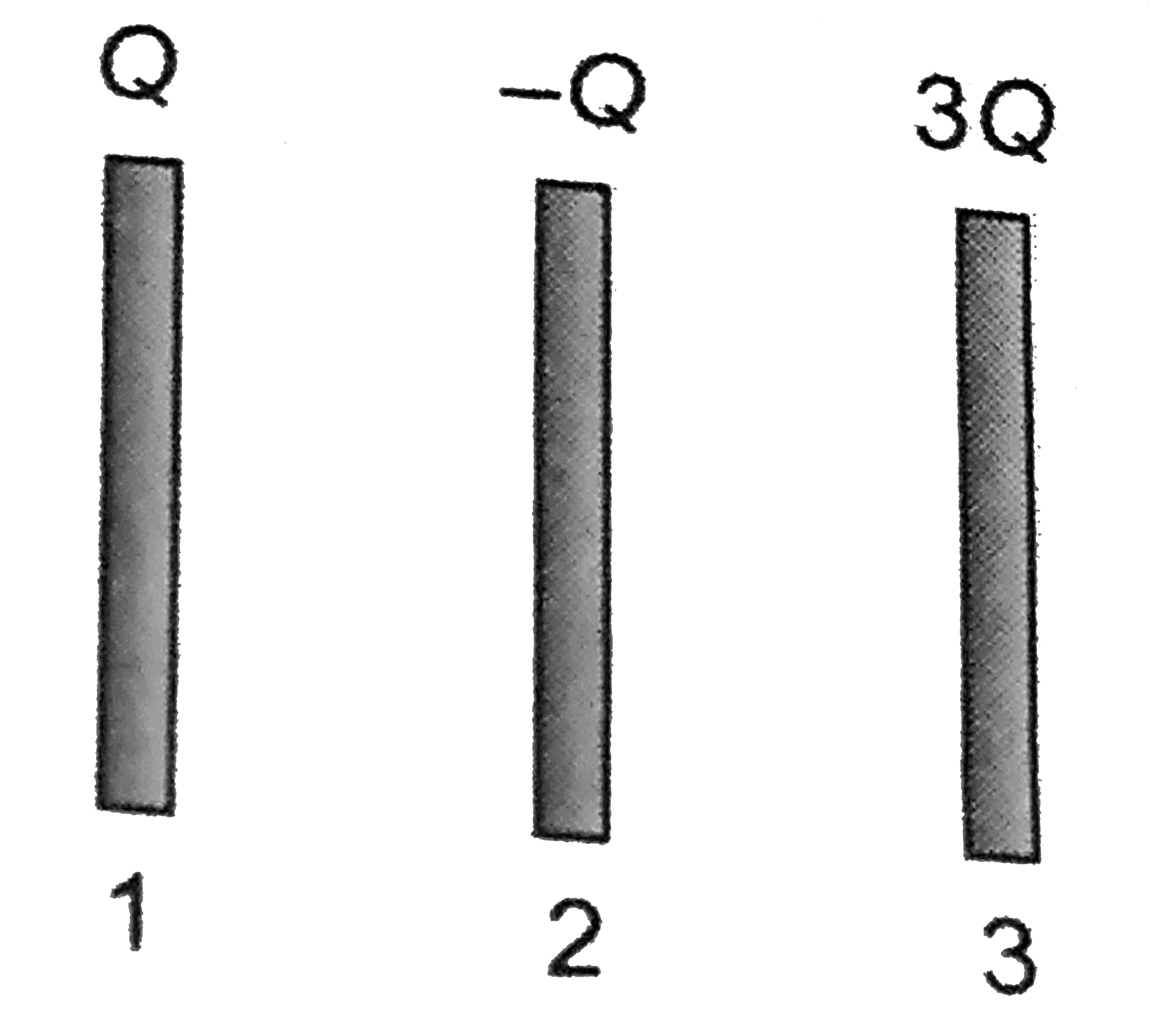
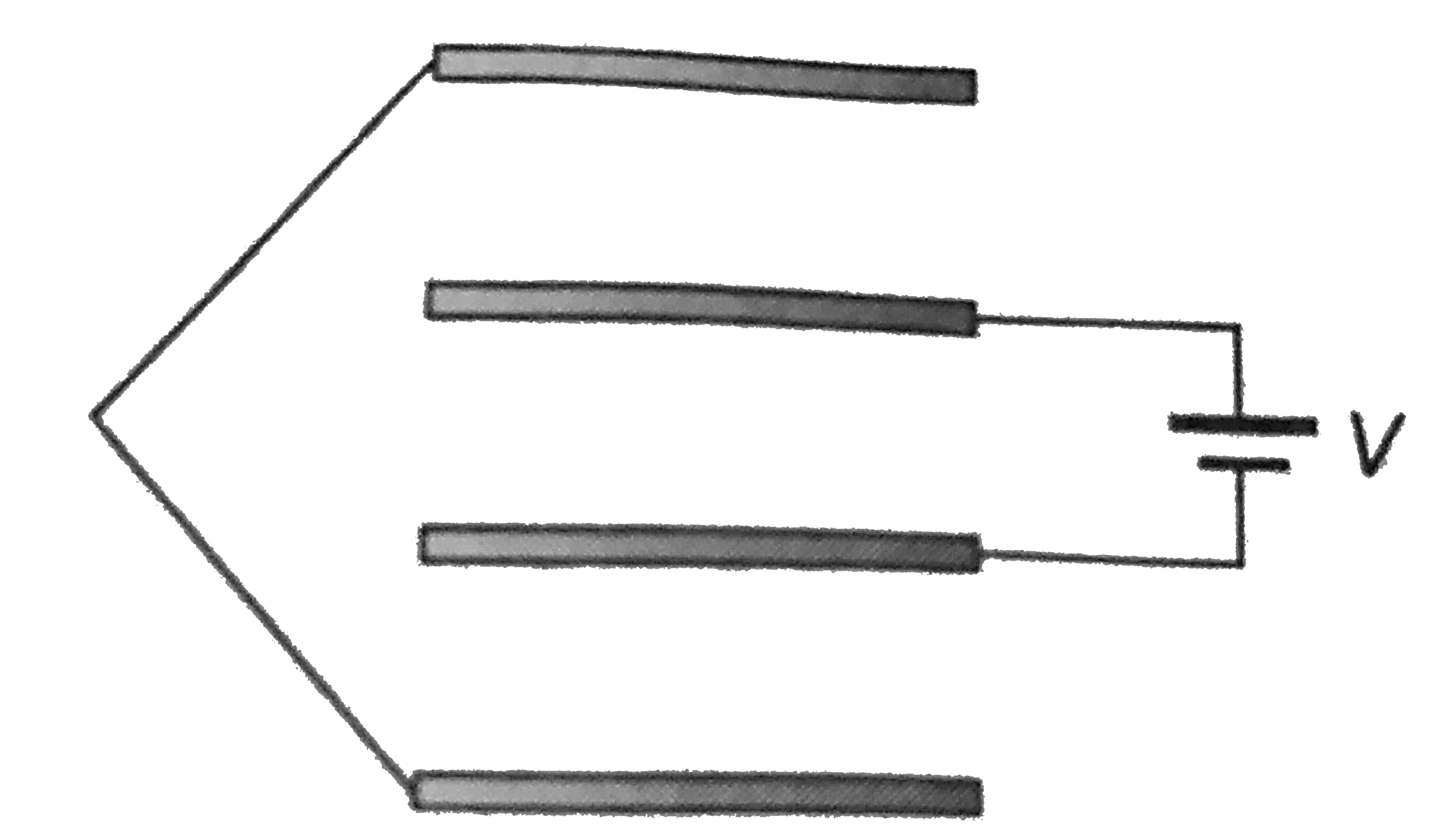
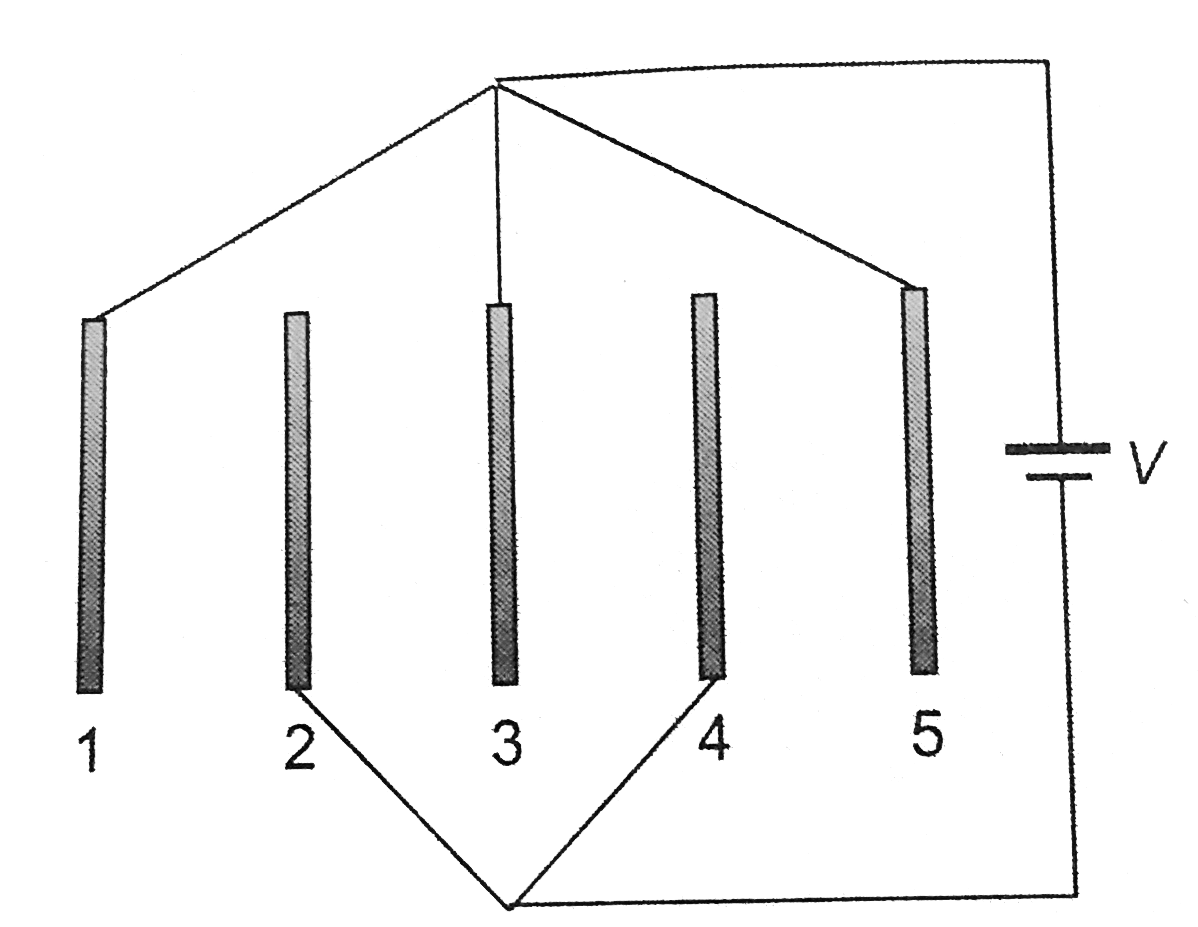 View Solution
View Solution
Knowledge Check
- Question 1 - Select One
Circuit in figure shows three capacitors with capacitance and their breakdown voltage. What should be maximum value of the external source voltage such that no capacitor breaks down ?
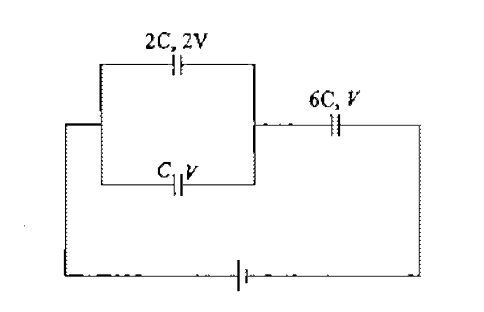 A1VB2VC1.5VD4V
A1VB2VC1.5VD4V - Question 2 - Select One
Two capacitor having capacitances 8μF and 16μF have breaking voltage 20V and 80V. They are combined in series. The maximum charge they can store individually in the combination is
A160μCB200μCC1280μCDnone of these - Question 3 - Select One
Assertion: Circuit containing capacitors should be handled cautiously even when there is no current.
Reason: The capacitors are very delicate and so quickly break down.AIf both assertion and reason are true and reson is the correct explanation of assertion.BIf both assertion and reason are true but reason is not the correct explanation of assertion.CIf assertion is true but reason is false.DIf assertion and reason both are false.
A man slides down a light rope whose breaking strength in η times his weight (η<1). What should be his maximum acceleration so that the rope just breaks ?
View SolutionAssertion (A): Circuit containing capacitors should be handled very carefully even when the power is off.
Reason (R ): The capacitors may break down at any time.View SolutionIn these questions, the 1st and The last sentence of the passage are numbered 1 and 6. The rest of the passage is split into four parts and named P, Q, R and S. These four parts are not given in their proper order. Read the sentences and find out which of the four combinations is correct.
1: A man should give the same care to himself that he gives to his car.
P: And sooner or later there comes a complete break down.
Q: Everyday tens of thousands of men are trying to work when their bodies and minds are in need of repair work.
R: For worry pulls down the mind and fatigue pulls down the body.
S : He does not try to drive his car when there is something wrong with it, he has to put it in order.
6: Man should realise that most worry and fatigue can be prevented.View SolutionRead the following text and answer the following questions on the basis of the same:
Tuning a radio set: In essence the simplest tuned radio frequency receiver is a simple crystal set. Desired frequency is tuned by a tuned coil/ capacitor combination, and then the signal is presented to a simple crystal or diode detector where the amplitude modulated signal, is demodulated. This is then passed straight to the headphones or speaker. In radio set there is an LC oscillator comprising of a variable capacitor (or sometimes a variable coupling coil), with a knob on the front panel to tune the receiver.
Capacitor used in old radio sets is gang capacitor. It consists of two sets of parallel circular plates one of which can rotate manually by means of a knob. The rotation causes overlapping areas of plates to change, thus changing its capacitance. Air gap between plates acts as dielectric.
The capacitor has to be tuned in tandem corresponding to the frequency of a station so that the LC combination of the radio set resonates at the frequency of the desired station.
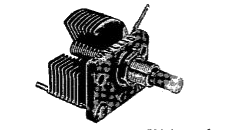
When capacitive reactance (XC) is equal to the inductive reactance (XL), then the resonance occurs 1 and the resonant frequency is given by ω0=1√LC current amplitude becomes maximum at the resonant frequency. It is important to note that resonance phenomenon is exhibited by a circuit only if both L and C are present in the circuit. Only then do the voltages across L and C cancel each other (both being out of phase) and the Current amplitude is open, VmR, the total source voltage appearing across R.
This means that we cannot have resonance in a RL or RC circuit.
Capacitor used in radio set for tuning is a:View SolutionRead the following text and answer the following questions on the basis of the same:
Tuning a radio set: In essence the simplest tuned radio frequency receiver is a simple crystal set. Desired frequency is tuned by a tuned coil/ capacitor combination, and then the signal is presented to a simple crystal or diode detector where the amplitude modulated signal, is demodulated. This is then passed straight to the headphones or speaker. In radio set there is an LC oscillator comprising of a variable capacitor (or sometimes a variable coupling coil), with a knob on the front panel to tune the receiver.
Capacitor used in old radio sets is gang capacitor. It consists of two sets of parallel circular plates one of which can rotate manually by means of a knob. The rotation causes overlapping areas of plates to change, thus changing its capacitance. Air gap between plates acts as dielectric.
The capacitor has to be tuned in tandem corresponding to the frequency of a station so that the LC combination of the radio set resonates at the frequency of the desired station.
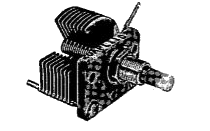
When capacitive reactance (XC) is equal to the inductive reactance (XL), then the resonance occurs 1 and the resonant frequency is given by ω0=1√LC current amplitude becomes maximum at the resonant frequency. It is important to note that resonance phenomenon is exhibited by a circuit only if both L and C are present in the circuit. Only then do the voltages across L and C cancel each other (both being out of phase) and the Current amplitude is open, VmR, the total source voltage appearing across R.
This means that we cannot have resonance in a RL or RC circuit.
Resonance may occur in:View Solution

